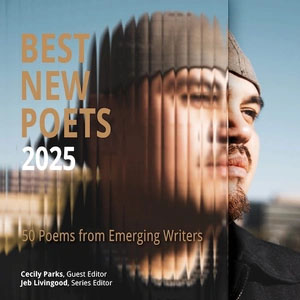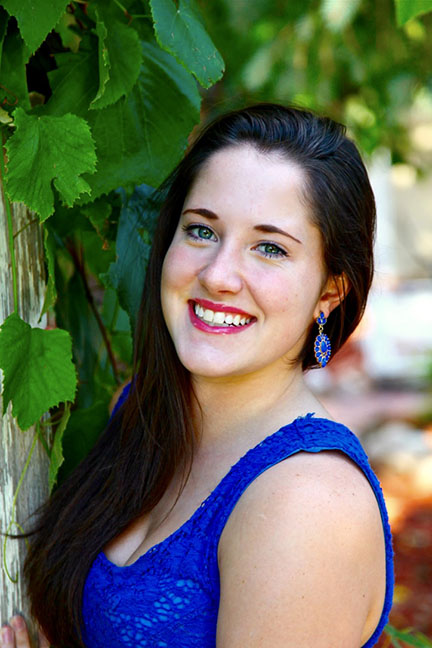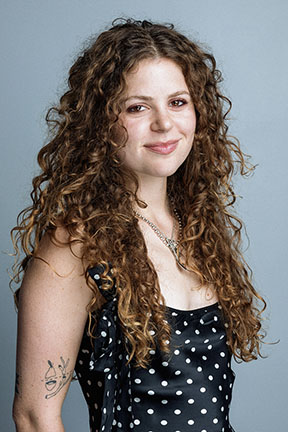Doctoral students Caroline Laganas and Kate DeLay have poems selected for inclusion in the Best New Poets 2025 anthology
By Ellie Johnson, Senior Writer
Winning any writing award is no small feat.
Florida State University English graduate students Caroline Laganas and Kate DeLay have both put extensive thought and consideration into their work over the years, earning them accolades and success as poets.
 This year, their dedication to their craft earned them the honor to be included in the Best New Poets 2025 anthology. The University of Virginia Press selects 50 emerging writers from the United States and Canada to be included in the collection.
This year, their dedication to their craft earned them the honor to be included in the Best New Poets 2025 anthology. The University of Virginia Press selects 50 emerging writers from the United States and Canada to be included in the collection.
Laganas and DeLay both went through the process of submitting their work, which was then reviewed by this year’s judge, award-winning poet and scholar Cecily Parks. Parks then selected Laganas, DeLay, and 48 others across the states and Canada to be recognized in the anthology, which was first published in 2005.
“It felt deeply gratifying to be included in this year’s Best New Poets, primarily just because it speaks to all of our hidden hours that are bearing fruit now being in the anthology,” Laganas says.
DeLay says earning this recognition is surreal.
“I’ve submitted to this quite a few years at this point,” she shares. “Like so many things in the poetry world, you submit about six to seven months before you hear back from anything, so you almost forget about it.”
The University of Virginia Press produces Best New Poets in cooperation with Meridian, an annual literary magazine at the university. The 2025 publication is scheduled for a November release date.
Caroline Laganas earned her Bachelor of Arts in journalism from Pepperdine University and her Master of Fine Arts from California Institute of the Arts. Her mentors at both institutions inspired her to further her writing journey at FSU, where she is now pursuing her doctorate in poetry.
Laganas is especially thankful for her dissertation committee at FSU, which includes three English department faculty members: Distinguished University Scholar Barbara Hamby  and Professors David Kirby and Andrew Epstein. Department of Modern Languages and Linguistics Professor Mark Pietralunga is also on her committee.
and Professors David Kirby and Andrew Epstein. Department of Modern Languages and Linguistics Professor Mark Pietralunga is also on her committee.
Hamby invited Laganas to write her Best New Poets entry, “Champagne or Maggots?” for an interdisciplinary showcase at FSU. Laganas says she cannot imagine getting to this point without Hamby’s help and support, along with the rest of her committee.
“They are all exceptionally talented and endlessly supportive of the work that I’m doing now,” Laganas says.
As a second-year doctoral student, Laganas is currently working on her dissertation, which combines her research in poetry and literary food studies.
“I am writing and illustrating my first book of poetry, which explores my family’s recipes as a way to interrogate notions of identity, from the individual to society,” Laganas shares.
Like her dissertation, many of Laganas’s poems are related to food and recipes. Her inspiration comes from her family’s recipes as well as family stories. “Champagne or Maggots?” addresses themes of food, family, and breast cancer.
I can’t imagine winning this award at any other point in my career than right now. I’ve had to write a lot of bad poems to get to this one, and just a lot of different poems to get to this one.
— Caroline Laganas
“I think that the selection really speaks to my work as a Best New Poet ,” Laganas says. “The poem is very representative of what I’m doing on the page, the work, or the inspiration behind the poem.”
Getting to this award-winning point in her career has been a commitment to navigating the highs and lows for Laganas.
“I can’t imagine winning this award at any other point in my career than right now,” she says. “I’ve had to write a lot of bad poems to get to this one, and just a lot of different poems to get to this one.”
Laganas’s poetry accomplishments do not stop at the Best New Poets award. Laganas is currently nominated for a Pushcart Prize.
“I’m honored to be nominated by the New Orleans Review for a poem I wrote in Dr. Celia Caputi’s Feminism and Travel class, which David Kirby helped me revise,” Laganas shares. “I owe many thanks to all of them, including my family and our recipes, for supporting my work.”
This fall semester, Laganas is teaching an undergraduate section of Women in Literature, with an emphasis on women poets who use food in their work, like herself. She uses classroom activities to gather inspiration for her poetry.
Laganas’ course is full for the Spring 2026 semester. Students interested in learning about the craft of writing from a Best New Poets recipient, while discussing female poets over food that Laganas cooks and bakes, should look for her class to take in the future.
Kate DeLay is in her first year at FSU, pursuing her doctorate in poetry. Originally from Tennessee, DeLay came to FSU after receiving her Master of Fine Arts in Creative Writing from the University of Alabama.
DeLay’s poem Best New Poets anthology is titled “Repair,” which is part of a larger collection she is currently working on. “Repair” comes from a thread in her collection centered on calves.
“My mother’s family grew up in East Tennessee, and they had cattle on their farm,” DeLay explains. “A lot of what I’m working through in these calf poems are ideas of forgiveness and understanding the place you come from and figuring out how to inhabit the language of that place but make it your own.”
“Repair” is the final calf poem in DeLay’s collection and symbolizes the feeling of making a home in the world.
“‘Repair’ is kind of a place of duality,” DeLay says. “It’s also really about song and music.”
A lot of what I’m working through in these calf poems are these ideas of forgiveness and understanding the place you come from and figuring out how to inhabit the language of that place but make it your own.
— Kate DeLay
DeLay focuses much of her poetry on the hymns she sang in church while growing up in Tennessee, so she incorporates the themes of song and music into her works.
“I write a lot about growing up in the South as a white evangelical queer person,” DeLay shares. “The complication of politics and religion, the beauty of community in those places, and the difficulty of community.”
An influence for DeLay’s poetry is that she is interested in doubling things. In “Repair,” for example, the calf doubles as the speaker.Her art of duality creates reflections, distortions, and clarity, she adds, while often maintaining the structure of a song.
As a first-year student, DeLay appreciates the English department faculty members who are already investing time in her and supporting her. Professor David Kirby, Distinguished University Scholar Barbara Hamby, and Assistant Professor Lamar Wilson specifically have been helpful.
“Those three people have really reached out to me and supported me since coming here,” DeLay says. “They have spoken to me in classes or in my work in a way that I feel seen and understood and felt like I could take risks in front of them.”
Outside of writing, DeLay finds inspiration in knitting, sewing, and photography. She embraces the patience that goes into the construction of clothing, a process that mirrors the construction of a poem and, once again, reflects duality in her life.
Currently, DeLay and Laganas are both working on larger collections of their poetry. Inclusion in the Best New Poets anthology is a significant accomplishment and will benefit them as they continue to develop their writing careers.
Ellie Johnson is a double major in English-Editing, Writing, and Media and in psychology.
Follow the English department on Instagram; on Facebook; and on X.
